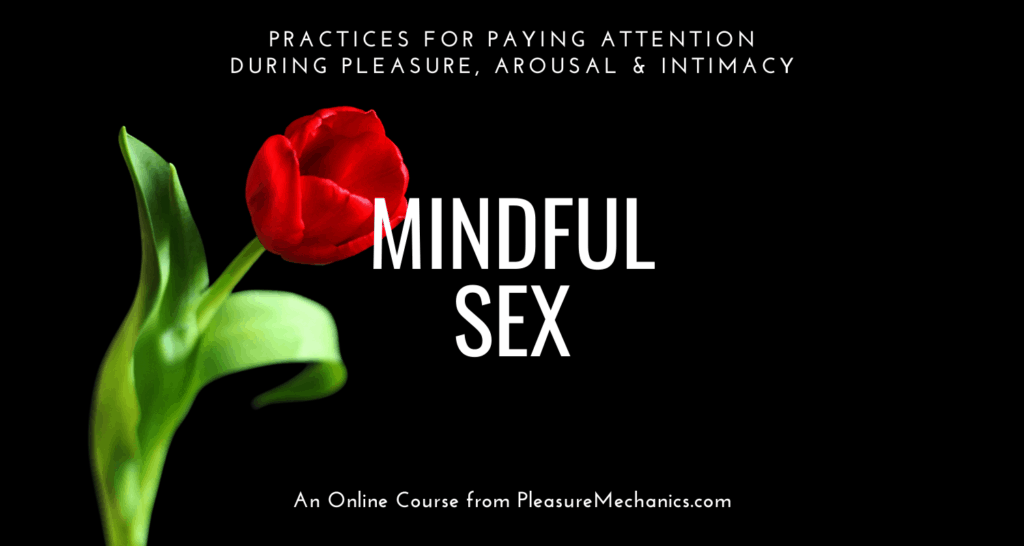Podcast: Play in new window | Download

If you want to have kinkier sex, you are going to want to build some foundational skills long before you ever pick up a toy. The skills of mindful sex – noticing your thoughts without judgment, staying present during the heights of arousal, paying attention to both the internal landscape and to another human’s subtle responses – are all crucial skills for stepping into new erotic terrain and having kinkier sex.
Kinky sex means different things to different people – but for most of us, it means stepping out of our comfort zones and exploring new erotic edges. To stay present and discover new pleasures at these edges, we must come with the right skills and attitudes to show up and explore with curiosity.
Join us in practicing the skills of Mindful Sex: enroll in the Mindful Sex Online Course

Transcription for podcast episode Explore With Curiosity: Attitudes For Kinkier Sex
Podcast transcripts are generated with love by humans, and thus may not be 100% accurate. Time stamps are included so you can cross reference or jump to any point in the podcast episode above. THANKS to the members of our Pleasure Pod for helping make transcripts and the rest of our free offerings happen! If you love what we offer, find ways to show your love and dive deeper with us here: SHOW SOME LOVE
Chris Rose: 00:00 Welcome to Speaking of Sex with the Pleasure Mechanics. I’m Chris.
Charlotte Rose: 00:04 I’m Charlotte.
Chris Rose: 00:05 We are the Pleasure Mechanics. On this podcast, we have explicit and soulful conversations about every facet of sexuality. Come on over to PleasureMechanics.com where you will find our complete podcast archive. While you are there, hit up PleasureMechanics.com/Free to find the erotic essentials, our free online course. It is an offering of love waiting for you.
Chris Rose: 00:35 All right. Today, on the show, we are going to be talking about mindful kink. Mindful kink, meaning how we can bring the skills of mindful sex to the kinkier sex, the more adventurous sex, the more thrilling, wild sex that we want to be having because through some of your emails I’ve received this month and some of our conversations, I recognize that when we talk about mindful sex, we often talk about things like slowing down and breathing and paying attention, and the language we use to talk about mindful sex paints a picture of very slow, meditative, breathy, tender sex, love-making perhaps you might want to call it, which is a lovely experience. I love meditation sex. It’s one of my best meditations, but it is not the only option.
Chris Rose: 01:40 It got me thinking about how mindful sex skills are actually not only welcome at the table for kinky sex, they’re not only enhancers for kinky sex and wild sex, they’re actually a prerequisite for kinky sex, they are required for showing up for some of the more adventurous, wild sex you might want to be having. So, I want to explore that today.
Charlotte Rose: 02:10 When we are thinking about kinky sex, we just want to be clear, that can be an enormous range of play and sensation and experiences and role play, and it can go from very light to very intense and people can find where they want to explore in this huge constellation spectrum, however you want to think about it.
Chris Rose: 02:32 Well, it’s interesting. I get these emails all the time that say, “I want to explore kinky sex with my wife. How do I get started?” and I always have to ask them, “What do you mean by kinky?” So, as we start this conversation, notice for yourself what do you think about as kinky sex, where does that spectrum of normal sex, what we might call vanilla sex or every day sex, where does that realm start fading into the extra, the kinky, that range of activities that’s beyond the norm for you?
Chris Rose: 03:11 Again, I say, “For you,” because for some people, things like masturbating in front of each other, anal sex, sex in different positions, sex not in bed, things like that feel very like, “Yeah, that’s just within the normal thing of what we explore,” and for other people, those activities are on the kinky edge of what they are willing or interested in exploring. For other people, kink starts at the spectrum of sensation play or bondage or power play or role play and then goes out from there into the great beyond of fetishes, of very extreme role playing, of long-term power play dynamics, things like that.
Chris Rose: 03:58 So, as we talk about this, it is applicable to all of that realm of kink because what is kinky for you is what is kinky in your world, in your erotic reality, and so these things we talk about, about the vulnerability, the newness, the extra layers of skills you need to bring when something is new for you. That will be true whether you’re talking about masturbating in front of each other with the lights on and looking at each other in the eye or tying one another up for the first time or group sex, whatever your destination is, the emotional experience of, “This is new. This is scary. I don’t know what I think about this. I don’t know if I have the right skills. How will I know if I like this?” that emotional experience of kink because that is so much the hallmark of kink is the exploration, the newness, the living on that edge, the exploring the edges, those experiences will be true for you no matter what edge you are exploring.
Charlotte Rose: 05:09 I love that. That’s so important to honor where we are and what feels risky and anxiety-producing, but also exciting, and learning how to get comfortable with that experience in your body no matter what you’re doing. We can learn how to calm ourselves when we feel nervousness and turn that into excitement and allow ourselves to keep moving into new spaces sexually, and that is one element that can keep our sexuality alive and interesting over the years. So, learning how to emotionally navigate the space of newness and discomfort and excitement is a really profound sexual skill to gain master over no matter what you’re doing.
Chris Rose: 05:56 Okay. So, there’s two realms of this skillfulness I want to talk about, and you just named one. It’s the emotional skillfulness that mindful sex practices can bring to the exploration of new terrain to the navigation of new terrain to managing pitfalls in that new terrain. So, let’s talk about that, the navigating newness and vulnerability. Then, there’s the skillset of as you’re exploring new sexual experiences, paying attention, discernment of what feels good and what doesn’t feel good, what you want more of, what you don’t, and all of those physical skills of mindful sex and how they show up in kinky play. Okay.
Chris Rose: 06:42 So, going into the emotional skills, you named it very succinctly when you said, “How do we navigate newness with curiosity?” Did you say that? You said something like that. But “How do we navigate newness with a spirit of curiosity?” might be the heart of it, right? So, when your partner comes to you or when you start recognizing a desire welling up for a new kind of sexual experience, and again, whatever the range of that is for you, how do you meet those desires with curiosity, with interest, and not shut it down with judgment and fear? That’s the first mindful sex skill coming into play, practicing non-judgment over your own and your partner’s interest.
Chris Rose: 07:34 So, you could even engage the conversation of, “What would that look like? What interests you about that? What do you find exciting about that? What parts of that do you want to experience?” because that conversation is where all kinky adventures start and where most people never even get on the ride because newness, especially if it’s something that is loaded with any cultural baggage, power play, cross-dressing, all kink, really, has cultural baggage, and so we are immediately confronted with judgment, and that judgment and the fear and the shame is enough to prevent most of us from even daring to explore these interests.
Charlotte Rose: 08:20 So, if we can learn to recognize our own judgment and decide if we agree with that or not, then we can begin to take one step into being curious about it or not and deciding if that’s something we would like to explore or have a conversation about exploring before we step into it, but that first piece of letting yourself be okay with the judgment, but not necessarily thinking that it’s true.
Chris Rose: 08:47 Or following its path, right? So, your partner comes to you with a new desire or you’re reading erotica and you come up with something and you notice this experience, and because you have practiced, because you are part of this community, because you’re listening to this podcast, you have this skillfulness in that moment, to take a breath, to recognize, “Wow. I’m feeling a lot of things about this spanking scene or this request to be spanked. I’m having all of these different reactions. Let me just pay attention to my reactions for a moment. That’s where it starts, slowing it down.
Chris Rose: 09:24 All right. So, we’re getting to the place of non-judgment. That is a lifetime of work. Then, bringing a spirit instead of curiosity. So, instead of the fear and the judgment and the immediate, “Will I be good or bad? Will I get it wrong?” so, again, the binary thinking of, “Is this good or bad? Right or wrong?” and, “What is the morality I’m assigning to this?” just coming at it with curiosity and going into conversation in this open-ended way of, “We don’t know what this means yet. We don’t have a goal. We’re just exploring.” Again, we’re just seeing the surfacing of this skill, the skillset of exploring without a goal and without striving and without having this narrow, right, wrong, binary thinking. That’s a skillset that we are practicing, again, and we’re practicing together.
Charlotte Rose: 10:19 I think you said this, but I just want to highlight this, that any sex that is outside of what we have thought of as “Normal,” is really deemed by culture to be problematic, and the list goes on and on about, “Oh.” Fill in that for whatever you think, but that is intentional culturally, so we need to understand that there’s an enormous amount that we could be doing with our bodies with each other that is deemed unsavory, and so it makes sense that you do feel judgment. That judgment doesn’t come from you. You’ve been taught that. I think that’s useful for us to understand that framing, that we are taught to judge anything that is not vanilla sex, and so it makes sense that you will feel judgment. Now, you choose if you agree or not.
Chris Rose: 11:08 We will talk, I think, next week about attitudes, and one of the things here that is a curve ball is that judgment is both bad and good judgment.
Charlotte Rose: 11:19 Oh.
Chris Rose: 11:19 So, pretty is a judgment. Judging things either as positive or negative is what we want to reign in. So, it’s not just the negative judgments. Those are the easiest ones to target, and what I mean by this is we have all sorts of cultural assumptions about the meanings of kink and about the deeper layers of what a kink means about someone, and when you’re confronting your judgments, you might confront judgments on both sides of what you want from your partner and what you don’t want, what you want from yourself and what you don’t want. You might be judging yourself and creating struggle equally around the things that you are striving for.
Chris Rose: 12:09 So, a lot of us strive, like, you want to be a powerful, dominant man because that means you’re mainly, but there’s this other part of you that really is interested in wearing underwear that are lacy, but that might mean that you’re feminine, and you’re judging that while you’re also judging yourself for not being something that you’re striving for, and so you see how these, the positive judgments and the negative judgments, they both attack you. When we, again, approach this with curiosity and inquiry and exploration and presence, you might find out you feel the most powerful and mainly while you’re wearing the lacy panties, and both of the constructs just explode into sparkles of pleasure and desire around you, right? Because you have embodied your truth, you have put on the panties, you’re in … You might discover something about what those panties mean for you that you never expected.
Charlotte Rose: 13:11 Or the deep power of authenticity and that feeling incredibly erotic and livening all of your cells as you stride forward in your beautiful underwear.
Chris Rose: 13:22 Right. Or you might find that putting those panties on makes you feel super soft, super tender, and that you just want to be held and comforted and luxuriated and silky fabrics, and that’s a really different thing, but you’ll never know if you don’t put on the panties. If you’re stuck in the fear, if you’re stuck in the judgment and the assuming you know what things mean, and that’s, again, so much of this for ourselves and for conversations with our partners. This is the beginner’s mind attitude of mindful sex.
Chris Rose: 13:55 If we go into these conversations assuming we know what things mean, we set ourselves up for a world of struggle. If you think you know what it means that your husband wants to put on your underwear, you’ve just projected all sorts of non-truths, delusions into that space where instead you could be walking into that space with presence, curiosity, open-heartedness and be like, “Let’s find out what this means. Let’s discover what this means one step at a time.”
Chris Rose: 14:31 All right. So, we’re getting a little deep in this. So, the point here is these are the attitudes that mindful sex, that this whole reframe … Because when we talk about mindful sex, there are practices, there are physical practices, emotional practices you can do again and again because that’s what a practice is, it’s something we do on repeat in order to develop a skill. There are practices you can do to develop these skills, but it’s also a reframing, a new lens to think about sexuality, and we want to paint the picture here how this new reframe can help you when you want to explore things, like kinky sex.
Chris Rose: 15:13 Having these different attitudes to even start the conversation with your partner makes a huge difference when you’re wanting to open up new doors together. So, practicing these skills before you even get to that door can be really helpful. You can build these muscles, build these capacities before you get to the scary parts of sexuality, and it doesn’t have to be scary. Why do we think of newness as scary? Things aren’t as scary if we come at it with skills.
Charlotte Rose: 15:47 That’s awesome. That’s a good … I’ve never quite [crosstalk 00:15:50] that before, actually.
Chris Rose: 15:51 But it’s very true, right? Things feel scary when we show up at them not resourced and not ready, and so many of us don’t feel ready in sex, and that is, sometimes, about the physical techniques, and we have you covered there, but so much of that is the readiness of our ability to be yourselves sexually and be with someone else sexually. That’s also so much about what we’re talking about with this mindful sex lens that we’ve been focusing on.
Charlotte Rose: 16:23 And being with uncertainty, being with not knowing, being with, “I don’t know if I’m good at this,” and being able to calm your emotional state as you are feeling those things.
Chris Rose: 16:36 Isn’t that the emotional truth of all sex? “I don’t know what’s going to happen. I don’t know what this is.” Part of why we love sex and we’re drawn to sex is the mystery of it and the surrender into the mystery of the sensations and the physical states we get into and that arousing state where we a little bit lose reality, and to be confident slipping into that mystery together I think is profoundly … It’s a skillful thing, but it’s also, like, a-
Charlotte Rose: 17:07 Well, it allows for more magic. It allows for your … You trust yourself and each other a little bit more or a lot more, and so you can let yourself move into an altered state because I think that’s what you’re saying about being … A certain kind of amazing sex allows both people to be slightly altered. You’re getting a little bit high from all of these hormones and chemicals that are zipping around your body and making you feel different than regular life.
Chris Rose: 17:35 Right. We’re building the skills to do that, not building the skills to have really clinical … I think sometimes when people hear skills, they think of really clinical, mechanical sex, but so many of these skills are the relational skills, the skills of paying attention, and the skills of the mysteries of sex so we can drop deeper into that erotic, ecstatic, expansive state.
Chris Rose: 18:03 So, let’s talk a little bit about this second set of skills. So, I think we’ve explored some of these positions, the relational skills, the attitudes. Let’s talk about the physical set of skills because when I became really aware of when I started exploring kinky sex in my early 20s was how much discernment you had to have, and discernment is different than judgment by the way, but discernment, meaning, “Oh. I like that. No, I don’t like that.” You need to be able … This is as a receiver. There’s a whole nother set of skills as a giver of kinky sex, being a top.
Chris Rose: 18:43 But as a receiver, what I became aware of is you need to be able to pay so much attention to what’s going on to the sensations, to the emotional experience, and be able to both be in that experience fully and receive it, but then subtly steer it, like communicate to your top, to the dominant, to the person giving to you what it is you want. Being a receiver is very active, right? You have to be able to communicate with your whole body, but then also to be able to communicate, whether it’s through safe-wording, which safe words are the agreed upon words to slow down or end a scene, whether it’s through safe-wording or through communicating, you have to be able to tell the difference between, “Oh, I want more,” and, “Ouch. No way. We have to stop.”
Chris Rose: 19:39 There were times I wasn’t able to do that. I didn’t have the skills or I didn’t exercise them enough, and that’s when scenes went bad and things went too far because I wasn’t either steering the action or stopping the action based on what my body was telling me. This is true, again, for all sex. If a person is touching you in any way, we want to be able to tell, “Oh, that feels good. I want more,” and the difference between, “Oh, more,” and, “No, thank you.” That is a skill to be able to tell that difference and then communicate that difference, and that is true during a handshake and that is definitely true when you’re being spanked or flogged or canned or fisted, but the skill is the same.
Charlotte Rose: 20:33 So, within that moment, there are two different things going on, right? There’s understanding and feeling what’s inside your own body. Are you feeling like a, “Yes,” or a, “No,” or a, “Slow down,” and hearing that and then there’s the communicating that and feeling safe enough to communicate, not worrying about what that says about you, how you are being perceived, if that person’s going to be mad at you or not, or if it’s going to be socially uncomfortable, whatever your concerns are, and prioritizing your own needs over that concerns, those sets of concerns, and just having the skill to communicate.
Chris Rose: 21:10 So, there’s, like … I think as you-
Charlotte Rose: 21:11 Three.
Chris Rose: 21:11 … break this down, there’s probably 12 skills that are … we’re drawing upon at the same time as those spanks are coming down, so our system is already heightened, we’re already activated. This is, again, why I talk about mindful sex as meditation during arousal. That is a skillset because if you are aroused during a spanking and you want to change the course of action, you need to find your presence, your communication, all that boundary work you talked about, and then be able to communicate in that moment, hopefully without ending it.
Charlotte Rose: 21:47 Uh-huh (affirmative). Just redirecting.
Chris Rose: 21:49 Right.
Charlotte Rose: 21:49 Requesting more of what you want.
Chris Rose: 21:52 Sometimes, and when these things are … when we have these skills practiced in our bodies, when they’re flowing right, when the conditions are right, they can be almost invisible, and your body feels how, if you just adjust your hips just like that and move your butt and then the spanks come down in that new place, it’ll feel so much better, and so you cock your hips and you sigh and your partner’s hands lands in a new place and you get the spank you want and you can relax into it, and then your partner notices, “Oh, that felt better,” and then they start paying attention and you’re in that flow together because meanwhile, as you’re doing that …
Chris Rose: 22:30 So, the paying attention inside is interoception, the communication, meanwhile your partner is practicing an extreme version of this placement of attention skill. If you are spanking someone, if you are flogging someone, if you are taking someone on any erotic journey, but especially an extreme one and they are trusting you with their body, you better be paying attention, and how do we pay attention, what are the skills of paying attention? Again, a whole skillset we can practice and develop and get better at. Again, paying attention while you’re aroused, paying attention while things are heating up, while your partner is both moaning and squirming. Did that moan mean it felt good or did that … We need to have these skills available to us in the heat of passion.
Charlotte Rose: 23:29 You can see how of course it makes sense, then, to have practiced these skills solo in non-aroused states and solo in aroused states so that you can understand what you’re feeling and give your full attention to those experiences so then you can practice them when you’re partnered in an aroused state doing interesting things.
Chris Rose: 23:51 Right. The solo practices and then the partnered practices that you can work into and build up to and, again, develop a language together and a set of practices and skills together so that you’re walking down the street, you’re holding hands, your partner takes their hand away, and you have the skillset to know and to adjust, “Was that the hand wasn’t holding in the right way or do they want to be alone or is my …” It’s like you have all of the skills to manage that intimate moment and find the just right then. Then, again, when you get to the restaurant and you’re sitting and you notice your partner wants to be on the bench and not on the chair and you offer it, and as soon as she relaxes into the bench, you’re like, “That’s just what she needed,” because you were paying attention.
Chris Rose: 24:38 You layer these practices into your life and into your sex life together, and so you have the skills and the vocabulary for those kinkier adventures and they don’t have to be as scary, again, because you’re arriving to them prepared and skilled. Again, this invitation into sexual skills is a new one for a lot of people. We do not live in a culture where there are places, organizations, communities’ support to develop, not only your sexual skills, but your relational skills, your love skills, your skills at being human and being in love and being in relationship with other people. We don’t get a lot of opportunities to practice these things and to talk about them, so we’re hoping that Pleasure Mechanics can be a resource for you to practice not only the sexual skills, but the skills of being in love and being in relationship and enjoying pleasure together as a human. Yes? All right.
Charlotte Rose: 25:49 Just those little skills. Just those little, teeny, teeny skills.
Chris Rose: 25:55 So, mindful kink. It was just really important for me to presence the idea that mindful sex skills take us on … or we take our mindful sex skills with us on the erotic adventures we choose, and that can be any range of erotic energies, erotic expressions, solo, partnered, groups, and these skills that we talk about are applicable in every erotic scenario I can imagine.
Charlotte Rose: 26:28 Which is part of the incredible magic of them. They also are very useful in the rest of life. I feel like I’ve been really paying attention to how all of these skills impact and influence the rest of life, and it’s also very powerful, but that’s another conversation. They’re really, really universal and beautiful skillsets to cultivate and develop individually and in partnership because it opens up a whole new depth to the experiences that you’re already having and opens doors-
Chris Rose: 27:00 Exactly.
Charlotte Rose: 27:01 … to the ones you want to have.
Chris Rose: 27:02 Thank you.
Charlotte Rose: 27:02 Yes. Beautiful.
Chris Rose: 27:04 So, come on over, PleasureMechanics.com/Mindful for a podcast-listener only pricing. For our mindful sex course, PleasureMechanics.com/Mindful where you will find our mindful sex course. There are more than enough practices already in the course to get you started and we will be adding new practices in the weeks and months to come. As we deepen and continue to explore these practices together in community, the course will be expanding and growing, and we would love to have you on board, exploring these practices with us. If you love this podcast and want to support this show, please come over to Patreon.com/PleasureMechanics, that’s P-A-T-R-E-O-N, Patreon.com/PleasureMechanics, and support this show with a sustaining, monthly pledge. We really appreciate all of our supporters and invite you to become a patron of the erotic arts at Patreon.com/PleasureMechanics. All right. We will see you next week with another episode of Speaking of Sex. I am Chris.
Charlotte Rose: 28:15 I’m Charlotte.
Chris Rose: 28:16 We are the Pleasure Mechanics.
Charlotte Rose: 28:18 Wishing you a lifetime of pleasure.



